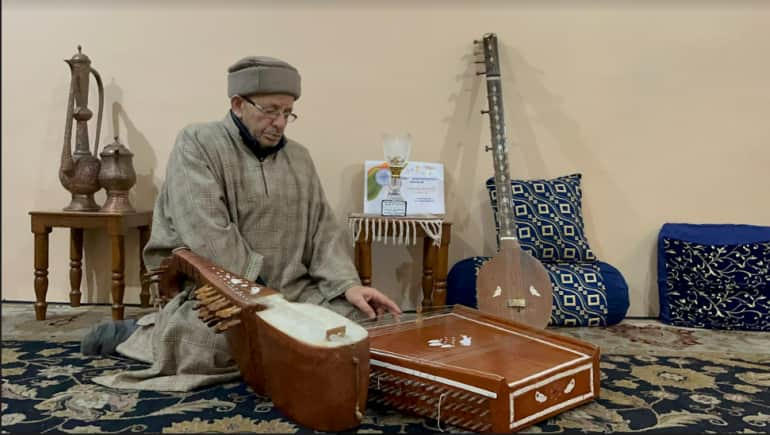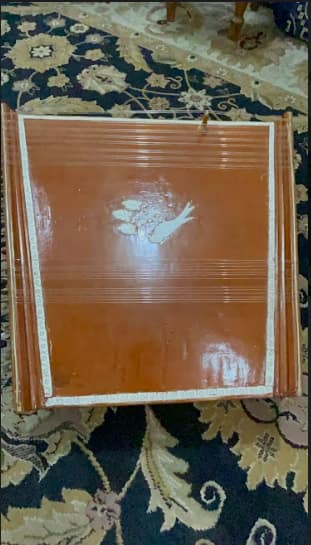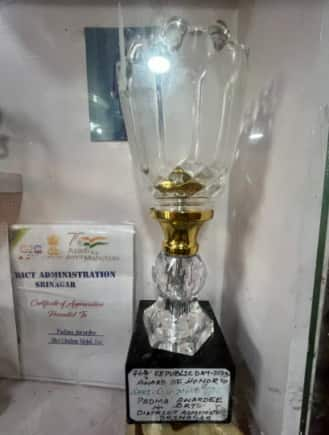



On the banks of river Jhelum in Srinagar’s Siraj Bazaar area of Zaina Kadal, Ghulam Mohammad Zaz is sitting in his house to handcraft santoor, a traditional musical instrument.
The 70-year-old Zaz is, perhaps, the last santoor-maker of Kashmir, who, after being trained by his grandfather Rehman Joo Zaz, his father Abdul Ahad Zaz, and uncle Ghulam Rasool Zaz, is carrying on the legacy of crafting the wood-and-string instrument.
 Ghulam Mohammad Zaz with the musical instruments he made. (Photo: Irfan Amin Malik)
Ghulam Mohammad Zaz with the musical instruments he made. (Photo: Irfan Amin Malik)
For his unique distinction to craft musical instruments, Zaz was honoured with the Padma Shri award on the occasion of the 74th Republic Day at Srinagar’s Sher-e-Kashmir Cricket Stadium.
Born and brought up in the downtown area of the city, Zaz is the last of the eighth generation of family who are known for making the finest santoor in the valley over the past several decades. “Since I was 12 years old, I have been associated with handcrafting musical instruments with my ancestors. Being the only one left in the business makes me rejoice,” Zaz, a septuagenarian, told Moneycontrol.
Zaz while speaking displayed a trapezoid shaped Santoor which he has recently crafted besides the Kashmiri sitar — a musical instrument with a plucked stringed instrument that contains movable frets and a gourd resonator.
Zaz attributes the success of handcrafting musical instruments to the "skills acquired from ancestors" and that has helped him get a good income and raise his three daughters, who are in different professions. His elder daughter is a doctor while another is a teacher and the third one is working in Jammu and Kashmir’s health department.
Wearing a checkered Pheran — the long robe traditionally worn in Kashmir in winter as protection against the cold — Zaz claims the musical instruments he makes will not be found anywhere in India. “Apart from santoor, I make sitar, dilruba, tawoos, surbahar, Indian sitar and tanpura. I make both Kashmiri as well as Indian musical instruments. For example, I make sarangi and rabab which Kashmiri musicians have been using for decades,” he says.
Sitting cross-legged and playing the santoor, Zaz gives full credit to santoor maestros Pandit Shiv Kumar Sharma and Pandit Bhajan Sopori, who introduced santoor in Indian classical music and Bollywood, that boosted his family's livelihood. “If my craft is alive today it is because legends like Pt Sharma and Pt Sopori infused a new life in santoor. They both played the santoor throughout the world to make it a famous musical instrument,” Zaz adds with a smile.
The late Pt Sopori was from Srinagar and Pt Sharma from Jammu, both passed away last year in quick succession. Pt Sharma had won numerous national and international honours, including the Padma Shri and Padma Vibhushan. Pt Sopori was a Padma Shri awardee, and a recipient of J&K State lifetime achievement award. “After their death, I do not see anyone in Kashmir who can play the santoor. There were local musicians earlier who were playing the santoor in Sufi music but they all have disappeared.”
The Sufi music, which was originally performed in Persian, later featured in Kashmiri and Urdu.
Amid harsh winter in the Valley, Zaz, these days, is working from his home, since his workshop in Zaina Kadal is closed. “My clients know me well and whenever they need a musical instrument they simply come to my home. I am deeply satisfied with my profession because no doubt it requires a lot of time, energy and skills but it has also given me reputation, money and fame. I have received good compensation for my work which ranges from constructing a home to funding my daughters’ schooling and marriage,” he says with a smile.
Because of his age and the non-availability of raw material, Zaz now makes a limited number of instruments. “I am getting older now but my customers across the world, including in India, the UAE, Germany, the US and the UK are knocking on the doors of my house and asking me to accept the orders to make various musical instruments for them,” Zaz says while attending the customers.
 Santoor-maker Ghulam Mohammad Zaz says it takes up to two months to make a santoor. (Photo: Irfan Amin Malik)
Santoor-maker Ghulam Mohammad Zaz says it takes up to two months to make a santoor. (Photo: Irfan Amin Malik)
He says, it takes him nearly two months to make a santoor. “Crafting a musical instrument requires mood, patience and skills. For decades, I have been making musical instruments while possessing all these three characteristics.”
When asked if he is the only santoor maker in Kashmir, Zaz replied he is not just the only santoor maker in Kashmir but in all of India.
 Awards won by Kashmir's santoor-maker Ghulam Mohammad Zaz. (Photo: Irfan Amin Malik)
Awards won by Kashmir's santoor-maker Ghulam Mohammad Zaz. (Photo: Irfan Amin Malik)
Since Zaz does not have a son and his three daughters are into different professions, the artistic channel cultivated for generations may probably end with his death.
The new generation, he says, is not interested in playing traditional musical instruments. “The young folks prefer a different genre of music because they do not understand the value of traditional music. With hip hop, rap and electronic dominating the musical scene in the valley, the traditional music is dying a slow death,” laments Zaz.
He also believes that he cannot make young people learn the art of making musical instruments. “I can't make people learn because whatever is in my head can not be transferred to others. It is a cumbersome and tough technique which my elders have taught me and I won’t be able to share it with others.”
Zaz also says that a special type of raw material which is rarely available is required to make traditional Kashmiri santoor. “When people can't find the special type of woods and materials like banned elephant tusks, how can people even think of making santoor. Whatever raw material I required, I had it because it was provided to me by my ancestors.”
Discover the latest Business News, Sensex, and Nifty updates. Obtain Personal Finance insights, tax queries, and expert opinions on Moneycontrol or download the Moneycontrol App to stay updated!
Find the best of Al News in one place, specially curated for you every weekend.
Stay on top of the latest tech trends and biggest startup news.